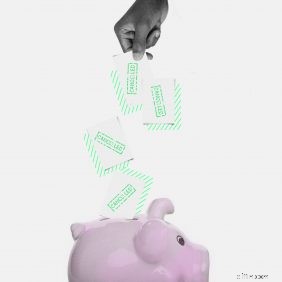50 Möglichkeiten, wie Sie jetzt Geld sparen können
Sie müssen es selbst tun.
Wenn es eine Lektion aus der finanziellen Verwüstung durch das Coronavirus im Jahr 2020 zu lernen gibt, dann lass es diese sein:Hilfe ist da draußen, aber sie wird nicht nur zu dir kommen.
In diesem Jahr kann man das wörtlich nehmen. Wie Amerikaner, die die letzten Monate mit sozialer Distanzierung verbracht haben, sehr wohl wissen, sind Sie am Ende des Tages auf sich allein gestellt. Und obwohl es eine Reihe von Hilfsprogrammen für die Millionen gibt, die finanziell aus der Bahn geworfen wurden, sind fast alle mit der gleichen Bedingung verbunden.
„Man muss danach fragen – und zwar auf die richtige Weise“, wie Liz Weston von NerdWallet es kürzlich formulierte.
Wenn Sie beispielsweise von COVID-19 betroffen sind, haben Sie nach dem Konjunkturgesetz der Bundesregierung das Recht, von Ihrem Kreditkartenaussteller eine „Unterkunft“ zu nehmen, die den Verzicht auf Verspätungsgebühren, niedrigere Zinssätze oder sogar die Möglichkeit, Zahlungen zu überspringen – ohne Ihre Kreditauskunft negativ zu beeinflussen. Aber um diese Unterkunft zu bekommen, müssen Sie die Kleinarbeit erledigen, indem Sie Ihren Kreditkartenaussteller anrufen und danach fragen.
Ebenso gibt Ihnen dasselbe Gesetz das Recht, eine Stundung für eine staatlich abgesicherte Hypothek für mindestens 180 Tage zu beantragen, was bedeutet, dass Sie Zahlungen überspringen können, ohne dass Verspätungsgebühren oder zusätzliche Zinsen anfallen. Diese Zahlungen sind möglicherweise am Ende der sechs Monate in einer Summe fällig, oder Sie können sie möglicherweise bis zum Ende Ihrer Laufzeit anhängen – aber auch hier müssen Sie Ihren Kreditgeber anrufen und fragen.
Es sind nicht nur staatliche Programme. Im März kündigte die Autofinanzierungsabteilung der Ally Bank an, Neukunden eine 90-tägige Pause bei ihrer ersten Zahlung zu gewähren. Die Bank of America kündigte an, die Kreditzahlungen aufzuschieben und am Ende der Laufzeit hinzuzufügen. Die TD Bank sagte, sie würde auf Gebühren für die Auszahlung von CD-Konten vor der vollständigen Fälligkeit verzichten. Aber in jedem Fall – Sie haben es erraten – musste man anrufen und fragen.
Die Regierung erhöht das wöchentliche Arbeitslosengeld bis Juli um zusätzliche 600 US-Dollar. Das ist automatisch … wenn Sie es überhaupt schaffen, Vorteile zu erhalten. Der Weg zu den staatlichen Arbeitsämtern ist zur Herkulesaufgabe geworden, da archaische Systeme plötzlich überschwemmt werden. Tatsächlich waren relativ wenige Hilfsprogramme automatisch. Stimulus-Checks gab es innerhalb bestimmter Einkommensgrenzen ebenso wie Stundungsprogramme für staatliche (aber nicht private) Studienkredite.
Ansonsten liegt es an dir. Und in gewisser Weise, sagen Experten für persönliche Finanzen, war das schon immer so. Niemand wird sich so um Ihre Finanzen kümmern, wie Sie es tun würden – kein Makler, Wirtschaftsprüfer oder Finanzberater. Und schon gar nicht die Regierung.
„Das war mein Ziel, als ich die Suze Orman Financial Group eröffnete:Menschen so unabhängig wie möglich von Leuten wie mir zu machen“, sagt die Personal-Finance-Autorin und Podcasterin Suze Orman. „Als ich meine Firma gründete, mussten [meine Kunden] zu Charles Schwab gehen und ihr eigenes Konto eröffnen. Sie würden mir ein Beratungshonorar zahlen. Ich habe kein Geld verwaltet – weil ich wollte, dass sie verstehen, dass sie ihr eigenes Geld verwalten können.“
„Wenn Sie den besten Finanzberater der Welt finden wollen, schauen Sie in den Spiegel“, sagt Orman. „Weil sich niemand mehr um dein Geld kümmern wird als du.“
Orman sagt, sie hoffe, dass diejenigen, die dieses Jahr gezwungen waren, sich aus einem finanziellen Loch zu befreien, nicht vergessen werden, wie schwer es ist – und danach streben, sich in eine Position zu versetzen, in der sie beim nächsten Mal nicht auf andere Menschen angewiesen sind.
Wenn Sie bereit sind, in diesem Jahr die Kontrolle über Ihr Geld zu übernehmen, finden Sie hier 50 von Experten empfohlene Anlaufstellen.
Mit Berichten von Kara Cutruzzula. Illustrationen von Elisa Faye.
Prüfen Sie die Kreditberatungsdienste
 Illustrationen von Elisa Faye
Illustrationen von Elisa Faye Sie müssen sich nicht alleine durch eine schwierige finanzielle Situation kämpfen. Unabhängig davon, ob Sie eine große Menge hochverzinslicher Schulden haben oder einfach nur eine Beratung zur Budgetierung und zum Sparen wünschen, kann Ihnen ein zertifizierter Kreditberater kostenlose oder kostengünstige Einzelberatung bieten. Kreditberatung wird häufig von gemeinnützigen Organisationen angeboten und ist eine risikoarme Option, die Ihnen hilft, einen klareren Überblick über Ihre finanzielle Situation zu erhalten. Consolidated Credit startete die Shutdown Hotline, einen kostenlosen Telefondienst, der Schuldenanalysen und Verweise auf COVID-19-spezifische Ressourcen anbietet. Und die National Foundation for Credit Counseling (NFCC) bietet auch kostenlose Kreditberatungsdienste an, die sich der Unterstützung von Menschen angesichts der Pandemie widmen.
WeiterlesenKnirschen Sie Ihre „Überlebenszahl“
Viele Menschen schnallen sich gerade mit dem Sparen zusammen – wie tief können Sie gehen? Um Ihre „Überlebenszahl“ zu ermitteln, addieren Sie alle monatlichen Kosten für das Nötigste:Miete, Lebensmittel, Gesundheitsversorgung usw. Sie müssen nicht unbedingt von Ihrem Überlebensbudget leben, und wenn Sie eines berechnen, sind Sie nicht gemeint nehmen eine Knappheitsmentalität an. Tatsächlich ist es wichtig zu wissen, wie einfallsreich man sein kann, schreibt NextAdvisor-Mitarbeiterin Jully-Alma Taveras, Schöpferin des YouTube-Kanals Investing Latina. Die Überlebenszahl von Jully-Alma beträgt 581 $; Verwenden Sie ihre herunterladbare Tabelle, um Ihre herauszufinden.
WeiterlesenEröffnen Sie ein Rechnungskonto
Dies ist ideal, wenn Sie Ihre Rechnungen häufig zu spät bezahlen oder sich verschulden. Sierra Howard von @IDontDoBudgets empfiehlt, ein spezielles Rechnungskonto zu erstellen, indem Sie alle Ihre festen monatlichen Ausgaben berechnen und ein Polster von 50 $ hinzufügen (um Überziehungsgebühren zu vermeiden). Richten Sie ein separates Girokonto ein, zahlen Sie den Gesamtbetrag monatlich direkt darauf ein und stellen Sie Ihre Rechnungen von demselben Konto auf automatische Zahlung. Betrachten Sie es als tabu und nur für Rechnungen.
Fehler in Ihrer Kreditauskunft beheben
Neu in diesem Jahr:Die drei großen Kreditauskunfteien – Equifax, Experian und TransUnion – ermöglichen es Ihnen, Ihre Kreditauskunft bis April 2021 wöchentlich kostenlos zu prüfen. Stellen Sie die Anfrage unter annualcreditreport.com und nehmen Sie sich dann 15 Minuten Zeit, um sie durchzugehen Ihre Kreditauskunft und stellen Sie sicher, dass Ihre Informationen korrekt sind. Laut einem Bericht der Federal Trade Commission aus dem Jahr 2013 hat etwa jeder fünfte Verbraucher einen Fehler in seiner Kreditauskunft, und einige Fehler kosten Sie zusätzliches Geld für Kredite oder Versicherungspolicen. Da aufgrund der COVID-19-Härte neue Schuldennachsichtsoptionen erweitert werden, gibt es noch mehr Gründe, eine Genauigkeitsprüfung durchzuführen. Diese Vorkehrungen sollten in Ihrem Bericht nicht als abwertend wiedergegeben werden. Wenn Sie einen Fehler finden, verwenden Sie unsere E-Mail-Vorlage, um eine Beschwerde einzureichen; die Kreditauskunfteien werden gesetzlich beauftragt, dies zu untersuchen.
WeiterlesenBanking-Benachrichtigungen einrichten
Wenn Sie es vermeiden, auf Ihre Kontostände zu schauen, weil es Sie stresst, verpassen Sie eine Gelegenheit, bewusster mit Ihren Ausgaben umzugehen. Manchmal ist es besser, die Informationen zu Ihnen kommen zu lassen:Gehen Sie zu Ihrer Online-Banking-Plattform und richten Sie eine E-Mail- oder Handy-Benachrichtigung für jede Kreditkartenbelastung oder Kontoschuld ein. Möglicherweise entdecken Sie Ausgaben, von denen Sie nicht einmal wussten, wie wiederkehrende Abonnements.
Probieren Sie eine neue Budgetierungsstrategie aus
Die Chancen stehen gut, dass Ihr Budget dieses Jahr zum Fenster hinausgegangen ist. Unabhängig davon, ob Sie einen Einbruch beim Einkommen erlitten oder Ihre Ausgabegewohnheiten während des Lockdowns geändert haben, ist es wahrscheinlich ein guter Zeitpunkt, Ihre Finanzen zu überprüfen. Eine Taktik, die es wert ist, ausprobiert zu werden:Zero-Based Budgeting. Es zwingt Sie, jedem verdienten Dollar einen Zweck zuzuweisen, also ist es eine großartige Möglichkeit, Ihre Absichten in Bezug auf Sparen und Schuldenmanagement neu zu setzen. „Broke Millennial“-Autorin (und NextAdvisor-Mitarbeiterin) Erin Lowry sagt, dass es besonders nützlich für Menschen mit unregelmäßigem Einkommen ist.
WeiterlesenKlicken Sie bei Ihrer Hypothek auf Pause
Es ist etwas zu bedenken – mit Vorbehalten. Das CARES-Gesetz (Coronavirus Aid, Relief, and Economic Security) hat es den meisten Hausbesitzern erleichtert, an Nachsichtsprogrammen teilzunehmen, indem sie im Wesentlichen Hypothekenzahlungen für bis zu einem Jahr aussetzen oder reduzieren, ohne ihre Kreditwürdigkeit zu beeinträchtigen oder Sondergebühren zu erheben. Diejenigen mit staatlich abgesicherten Hypotheken können diesen Weg einschlagen, indem sie ihre Kreditgeber anrufen, aber Sie sollten zuerst über die Kompromisse Bescheid wissen. Zinsen fallen weiterhin an und Sie müssen in Zukunft versäumte Zahlungen nachholen.
WeiterlesenErweitertes Arbeitslosengeld beantragen
Das Arbeitslosengeld ist ein wichtiges Sicherheitsnetz in Krisenzeiten. Dank der Bestimmungen des CARES-Gesetzes zur Pandemie-Arbeitslosenunterstützung (PUA) haben zum ersten Mal viele Selbständige, unabhängige Auftragnehmer und Teilzeitbeschäftigte Anspruch auf Leistungen. Das Konjunkturpaket fügte allen berechtigten Ansprüchen einen zusätzlichen wöchentlichen Vorteil von 600 US-Dollar hinzu, der jedoch Ende Juli auslaufen soll. Die Beantragung von Leistungen kann schwierig und zeitaufwändig sein, zumal Staaten einen Rückstand bei Anträgen aufholen. Wenn Sie der Meinung sind, dass Sie berechtigt sind, empfehlen wir Ihnen, den Antrag online einzureichen und sich mit den erforderlichen Informationen vorzubereiten.
WeiterlesenQuit Smoking
Everyone knows it’s an expensive habit, and COVID-19 has given us a new incentive to keep our lungs healthy. In the U.S., the average price of a pack of cigarettes is $6.28. Use this calculator to determine how much money quitting will save you weekly, monthly, even after 20 years, based on how many cigarettes you smoke a day and the cost of a pack in your area.
Call Your Lenders
 Illustrations by Elisa Faye
Illustrations by Elisa Faye If you can’t afford to pay your bills right now, it pays to be proactive. Many credit card issuers and lenders are working out deals with people who have lost income due to the pandemic, and experts say it’s in your best interest to be transparent about your situation before you fall behind. Call your lenders, explain your circumstances, and ask about any hardship programs they have in place. They might lower your interest rates, allow you to skip or defer payments, or pay later with additional interest, all of which are better options than skipping payments altogether. Liz Weston offers useful talking points here. And as Ron Lieber at the New York Times recommends, document your conversations to make sure your lenders follow through on what they say.
Get Help with Home Buying
Believe it or not, the housing market is still churning, and many Americans are moving forward with their dreams of becoming first-time homeowners. If that’s the case for you, consider whether there are any special loans, grants, or assistance programs you can take advantage of. We talked to Olivia Bernard, a 23-year-old who bought her first home in Georgia in part thanks to multiple assistance programs. Check out this list of resources, which has links to first-time home buyer services in every single state.
Read moreGet a Balance Transfer Credit Card
If you’re having trouble paying down your credit card debt because the interest portion is high and you have good credit, you might be a candidate for a balance transfer. Many of these cards offer an introductory 0% APR, meaning you can give yourself time to pay off the debt without interest. Due to the impact of COVID-19 on the economy, credit card issuers are a bit nervous about extending credit, making access and incentives less available than before the pandemic. But if you’ve got a high credit score (around 670 or higher), it’s a financial tool worth considering. Be aware this move often comes with fees:It can cost between 3% and 5% of your balance to transfer your debt to the new card.
Read moreRedirect Your Savings
How different are your spending habits today compared to six months ago? With many recreational activities ruled out because of the lockdown, one smart tactic is to take all the money you were spending on a gym membership, eating out, travel, and social activities, and funnel it into a high-yield savings account or paying down debt. Not only will you get a better sense of where you want to spend your money again when you’re able), but you’ll feel like you accomplished something when your favorite activities do return.
Build Your Emergency Fund
This one’s important. Building a savings cushion is a fundamental step toward financial wellness — one that can protect you in tough times and help you grab opportunities in good times. This year’s sudden unemployment crisis shows us not only how useful an emergency fund is, but how hard it is to achieve. Don’t be overwhelmed, though. Start small with a goal that feels reasonable to you. Putting even a few dollars away every month for the future can become a lifeline during extreme circumstances. Check out our emergency fund guide for more inspiration.
Read moreRefinance Your Mortgage
Homeowners:If you have job security and expect to be in your home for more than a few years, now could be the time to take advantage of low mortgage rates. The government has lowered both short- and long-term interest rates to encourage investments and keep the market stable. These rates give homeowners the opportunity to lower their monthly mortgage payments, adjust their loan term, or get a fixed-rate mortgage instead of a variable-rate mortgage. Don’t be afraid to shop around and compare rates from various lenders to make sure you’re getting a good deal. And don’t rush it — low interest rates are here to stay for a while, experts say.
Read moreGet a Spotify Discount
How’s this for easy listening:You can save about $12 a month by switching to a Spotify family account and splitting the cost with up to five people.
Follow the Experts
Make your screen time a bit more productive by adding a dose of money inspiration to your feed. Danetha Doe has one mission:to elevate the self-worth and net worth of women. NextAdvisor contributing editor Farnoosh Torabi answers questions and interviews notable guests three times a week on her podcast “So Money.” And Tiffany “The Budgetnista” Aliche says she has helped more than 800,000 women save more and pay off debt.
Return One Item
Look around your house or apartment. Is there anything you recently purchased that you haven’t opened or used because it wasn’t quite what you imagined or needed? Don’t let it sit there. Fill out the return form to get your money back, then arrange to have it picked up or drop it off at the post office if possible. There’s no point in eating the cost of something you’re not going to use.
Borrow From Your 401(k) — But Only If You Have To
This is usually a big no-no, but tough times require tough moves. Taking money out of your 401(k) or other retirement account can pull you off track from your long-term goals and lock in market losses, but personal finance experts say it can be a better move than taking on unmanageable debt right now. That’s partly because the calculus has changed in 2020, with federal stimulus legislation waiving the usual steep penalties that come from tapping your 401(k) early. Read up on the new rules and see if this is the right move for you.
Read moreCheck Your Subscriptions
 Illustrations by Elisa Faye
Illustrations by Elisa Faye Maybe you signed up for a cable channel for one sporting event, or subscribed to an online program when you needed to learn a certain skill. But are they still relevant to your life now? A quick scan through a credit card bill can help you discover any recurring subscriptions and monthly payments that you no longer need. Take a few minutes to cancel them and consider all the money you’re saving.
Stay Away From Credit Repair Companies
Building good credit is essential to your financial health, and poor credit will cost you. So it might seem tempting to hire a credit repair company that promises to do the work of repairing your credit score for you. Many such companies have stepped up their advertising outreach during the pandemic. But beware:These companies aren’t worth the cost, and you can do everything they promise to do by yourself — for free.
Read moreChoose a ‘No-Spend Day’
This is easier than you think, especially if you’re spending a lot of time in your home. Pick one day of the week where you commit to spending zero dollars — no ordering takeout or buying anything online. If all goes well, repeat the following week.
Upcycle Something in Your House
If you want to cut back on shopping, you can still get creative. The Instagram account @upcyclethat features tutorials to transform everyday or discarded objects into something new.
Get Credit for Your Work
Your credit report follows you for life, and it tracks your financial history in obsessive detail. Then, banks use the information on your report to calculate your credit score, a three-digit number that determines what kind of terms you’ll get on financial products like mortgages or insurance policies. Before the stakes are too high, like when you’re applying for a car loan, get familiar with how your credit score is calculated. The formula’s not a secret, and with enough time and patience you can manipulate it. Plus, the same behaviors that will boost your credit score are also likely to get you in better financial shape.
Read moreJoin an Online Community
Sometimes it’s helpful to know that other people are going through a similar situation. The free online network Ladies Get Paid has thousands of members offering help on finding a job or looking for a mentor, and NPR’s Facebook community Your Money or Your Life features advice from members on saving and investing.
Funnel Your Transportation Cash
Subway ridership in New York is down 92%, which means thousands of people are saving money usually spent on their daily commute — as much as $127 per month, if you typically buy a 30-day MetroCard. The same goes for car-friendly cities, too. Rather than spend that savings elsewhere, take the money usually spent on gas or public transportation and earmark it for a future use.
Choose the Right Bank Account
Saving money is hard. Don’t make it harder by using the wrong type of bank account. Your four main options are a savings account; a checking account; a certificate of deposit, or CD; and a money market account, or MMA. Check out our guide to choosing the right one, which is all about finding the optimal balance of interest rate, liquidity, and fees. And remember you can use a mix of accounts that suit your goals, such as CDs for a future down payment and a high-yield savings for an emergency fund.
Read moreGet Obsessed With Online Books
Your bookstore or local library might be closed, but their digital resources aren’t. Many library systems are connected to apps like OverDrive and Libby, which allow you to check out digital books from home — for free. Plus, signing up for a library card has never been easier and can usually be done from home.
Spend Your Credit Card Points
If you have a rewards credit card that racks up points with every dollar spent, now may be the time to cash them in. Maybe you were saving those points to redeem on a big trip — but if that no longer looks likely, you can instead use them to shop on your Amazon account, spend them at other stores on necessities you would have bought anyway, or even get cash back.
Use the 5-Second Rule
 Illustrations by Elisa Faye
Illustrations by Elisa Faye One trick to move forward on your money matters is to use the “5 Second Rule” created by author and talk show host Mel Robbins. It’s simple:When you have an instinct to act on one of your financial goals, Robbins says you have to do it immediately — or else your brain will find a way to shut it down. So if you want to be proactive, count backwards:5-4-3-2-1. When you reach “1,” take action. Check your accounts, look at your taxes, resist the impulse purchase. Counting down and giving yourself that window of time can distract you from worries and excuses.
Finish That Course You Already Bought
Maybe you wanted to learn a new skill or finally committed to buying the Malcolm Gladwell MasterClass six months ago, but then never actually started it. Now’s the time, according to Tonya Rapley of @MyFabFinance. You can calculate what you already spent on the course, and tell yourself you’re getting that money back — plus new knowledge — when you complete the course.
Check Out High-Yield Savings Accounts
The current national average savings rate is a measly 0.07% — but you can earn 10 times that by choosing a high-yield savings account with an online bank. If you’re fortunate to have some savings, or you’re working on building them up, consider moving that cash to a high-yield online savings account such as the ones offered by Ally and Marcus by Goldman Sachs. Your money will still be relatively accessible, but it’ll earn much more interest than it would in a traditional bank account. Compare your options, taking care to find the highest interest rate without any monthly maintenance fees or minimum balances.
Read moreConsider a New Student Loan Schedule
If you have a federal student loan, your payments have been suspended from March 13 to September 20, 2020 due to the COVID-19 crisis. This temporary relief can be extremely helpful if your income has gone down. Keep in mind that in most cases, interest will keep accruing even while you sit out payments. If your income hasn’t been affected in recent months, and you can afford it, continue making payments. And if you need your payments to be more manageable in the long term, you can talk to your loan servicer about an income-driven repayment plan, in which your monthly payment is based on your income — and in some cases can be driven down to $0.
Become a Contact Tracer
Increased testing and tracing are two strategies for preventing the further spread of COVID-19 — and contact tracing is one of the fastest-growing jobs right now. It involves calling people who came into contact with confirmed positive patients, checking symptoms, and referring them to nearby resources. Qualifications vary by state and can range from having a high school diploma to a college degree, but tracing is usually fully remote and ranges from $17 to $22 an hour. Take this free course offered by Johns Hopkins University and look up the job requirements in your state.
Work on Your Estate Plan
Nobody likes to talk about death, but you’ll do yourself and your family a huge favor if you get your affairs in order while you’re healthy. If you don’t have a will or other estate documents, consider doing it now. Working with an attorney to draw up basic documents can cost between $500 to $1,000, advises CBS News business analyst and NextAdvisor contributor Jill Schlesinger — or there are online services like Quicken WillMaker &Trust, which costs around $90. Think of it as the smartest money move you can make for the future.
Read moreNegotiate Your Cell Phone Plan
How much data do you use per month? How many texts do you send? The cell phone plan you signed up for two years ago might not be as relevant to your life today. Log in to your account, check your usage, and call — yes, call — your cell phone company to negotiate your bill or adjust your plan. Knocking even $10 off a month will add up.
Talk to Your Landlord
Typically, this isn’t the most enticing idea, but when rent takes up an average of 35% of your income, it’s a good place to look for savings. If you’re renting and plan to stay through your lease, or possibly extend, and you’ve been a model tenant so far, try asking the owner to knock some dollars off your rent. With many people plotting to move elsewhere or outside bigger cities, they might rather keep a good tenant than risk searching for a new one. You’ll gain even more leverage if you team up with your neighbors and negotiate as a group.
Make Your Contributions Count
If you’re donating to a nonprofit or social justice organization like the NAACP Legal Defense Fund, try to make your money go even further. Many employers have a charitable match program — if they do, your money could go twice as far. Ask your HR department if you can’t find any details. Plus, keep an eye out on social media, because some generous individuals are offering to personally match donations if you share a screenshot of yours.
Avoid These Home-Buying Mistakes
If you’re thinking about buying a home in the near future, get educated on the money traps you might face. Putting down a small down payment, buying a house you can’t afford, failing to get a preapproval, getting the wrong kind of mortgage … there’s a lot to look out for. That’s why we asked Chris Hogan, author and personal finance expert, to walk us through the eight most common mistakes that first-time home buyers make.
Read moreBuy a Bike
With public transportation seeing record low ridership during lockdown, many are turning to alternate forms of getting around. Consider investing in a bicycle — not only can it save you money when it comes to subway fare or putting gas in the car, but it’s a cheaper form of exercise than a gym membership. Fair warning:Other people have had the same idea, and many bicycle companies are reportedly backlogged.
Find a New Go-To Cheap Meal
 Illustrations by Elisa Faye
Illustrations by Elisa Faye Sick of canned beans? Follow @budgetbytes on Instagram for delicious recipes that are also budget-friendly, like this“pizza” pasta salad, blackened shrimp tacos, or mushroom broccoli stir fry.
Trade In Your Electronics
If you’re in the market for a new phone, don’t forget about the one you already have. Apple has a trade-in program that offers up to $500 credit for certain devices, which can be used on a new purchase or as future store credit. You can also trade in an old computer for credit via the Apple website or, starting mid-June, in Apple’s retail stores. The trade-in program extends to tablets and watches, too. For other phones, Verizon offers a trade-in program, as does T-Mobile.
Automate, Automate, Automate
If you have a pang of fear every month and ask yourself, “When’s the credit card due? Is my electric bill paid? How much should I put into savings every month?” do yourself a favor and automate most – if not all — of your online bills and investments. Setting up automatic payments once will save you time, energy, and — yes — money every month (those late fees add up). Just make sure you’re adding enough cushion to your checking account to avoid any overdraft fees.
Sell Your Old Stuff
If lockdown encouraged you to go through your closet, you can list and sell some of your old clothes on a site like ThredUp, which calls itself the world’s largest online secondhand shopping destination — and recently partnered with Walmart to expand its e-commerce resale options. If you have more than just clothes, LetGo is another marketplace where you can connect with buyers.
Check in on Your Retirement Plan
“With so many other pressing financial demands — combined with living through a global pandemic and likely recession — it’s completely understandable why you may scoff at the notion of retirement,” writes Erin Lowry. But ignoring this situation now will only make things harder in the future. Assuming you’re able to meet your essential needs right now, Lowry breaks down a few smart tactics for keeping your retirement planning on track.
Read moreCharge More
No, not on your credit card. If you’re self-employed, a small business owner, or a freelancer, take a hard look at the rates for your services. When’s the last time you increased them or gave yourself a raise? Not all industries are down this year—if you have clients who are weathering the recession, consider starting the conversation. This applies to full-time workers too. Budgeting and saving hacks will get you far, but earning more will truly power up your finances.
Do Your Taxes
This year, Tax Day was postponed until July 15, giving people a little extra time to pull together their documents and file. But if you’re still putting it off, don’t wait:Since a majority of people get refunds every year, think of it as money waiting to be received.
Nail Down Your Emergency Fund Target
Every single expert says you should have an emergency fund. But once you dig into the details, there’s a lot less agreement. Should you sock away $1,000? Three months of expenses? A year of expenses? The truth is that the answer depends on many individual factors, like your job security, your goals, and even your age. We polled 11 different personal finance experts for their recommendations — and got 11 different answers. See which emergency fund target is right for you, and let that number be your guide as your work toward your savings goals.
Read moreStop Betting on the Lottery
The average American spends nearly $70 a month on lottery tickets and betting pools, according to research released by the Bureau of Labor Statistics last year. For older Americans, that figure is even higher:up to $132 per month. If you’re one of the people driving up those averages, compare the long odds of hitting the jackpot with the guaranteed interest rate you’d get on that money if you put it into a high-yield savings account.
Get a Deal on a Car
It’s not wise to rush into any big purchase, especially a car. But the recent bankruptcy of rental-car company Hertz has flooded the market with relatively cheap used cars, and experts say you may be able to get a steal of a deal. If you need to finance the purchase, make sure you can manage the debt. Author Suze Orman says a good rule of thumb is that you shouldn’t finance a car unless you can afford to pay it off completely within 3 years.
Ersparnisse
- 10 verschiedene Möglichkeiten, wie Sie frisches Wasser sparen können
- Kann ein kleines Haus viel Geld sparen?
- Kann das Pflanzen eines Gartens Geld sparen?
- Die 4 besten Möglichkeiten, wie Sie Ihr Geld verschwenden
- Cash-Back-Sites können Ihnen viel Geld sparen
- 5 Möglichkeiten, jetzt fürs College zu sparen
- 4 einfache Möglichkeiten, wie Sie mit Ihrem Telefon tatsächlich Geld sparen können
- 101 Möglichkeiten, Geld zu sparen
- 5 Möglichkeiten, wie Sie durch Organisation viel Geld sparen können
-
 5 Möglichkeiten, wie Sie als Remote-Arbeiter Geld sparen können
5 Möglichkeiten, wie Sie als Remote-Arbeiter Geld sparen können Als Telearbeiter werden Sie wahrscheinlich viel weniger Geld ausgeben – hier sind einige der Möglichkeiten, wie Sie viel sparen können. Remote Worker zu sein bringt viele Vorteile mit sich. Es ka...
-
 4 Möglichkeiten, wie Sie von einer hohen Kreditwürdigkeit profitieren können
4 Möglichkeiten, wie Sie von einer hohen Kreditwürdigkeit profitieren können Gute Anerkennung könnte wirklich hilfreich sein für mehr Möglichkeiten als eine. Schlüsselpunkte Eine gute Bonität macht es einfacher, erschwingliche Kredite aufzunehmen. Es gibt andere, weniger be...


